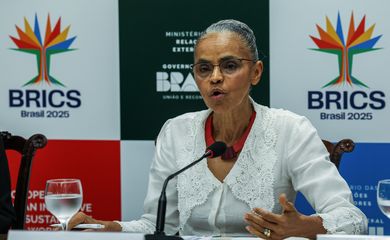BRICS countries reaffirm urgency of fighting climate change

The 11 BRICS nations on Thursday (Apr. 3) reaffirmed their commitment to urgently expanding efforts to address global climate change and its consequences, including biodiversity loss, desertification, land degradation, drought, pollution, and other environmental challenges.

The commitment is outlined in the joint declaration issued at the conclusion of the 11th meeting of BRICS environment ministers, representing Brazil, Russia, India, China, South Africa, Saudi Arabia, Egypt, the United Arab Emirates, Ethiopia, Indonesia, and Iran. The meeting, chaired by Brazil, was held at the Ministry of Foreign Affairs in Brasília.
“We reaffirm our firm commitment to expanding urgent actions to address the challenges posed by climate change, biodiversity loss, desertification, land degradation, drought and pollution, among others,” the signatories of the text declared, adding that “the eradication of poverty in all its forms and dimensions, including extreme poverty, is the greatest global challenge and a fundamental requirement for sustainable development.”
During the meeting, the ministers addressed four key topics outlined in the joint declaration: plastic pollution and waste management; desertification, land degradation, and drought; the preservation, restoration, and valuation of ecosystem services; and collective climate leadership, with synergies to Agenda 2030—the United Nations’ global action plan that sets out 17 Sustainable Development Goals (SDGs) and 169 interconnected targets.
“What has been decided is that we must triple [the use of] renewable energy sources, double energy efficiency, and ensure a fair and well-planned transition away from fossil fuels—one that is equitable for all,” said Brazil’s Environment Minister, Marina Silva, at a press conference following the ministerial meeting.
Multilateralism
The joint declaration also underscores the importance of multilateralism and cooperation in environmental protection and sustainable development. The ministers voiced concern over the potential shortfall in pre-agreed financing commitments, including the pledge by developed nations to jointly allocate $300 billion annually by 2035 to support climate action in developing countries. This commitment was approved at the 29th Conference of the Parties (COP29) to the United Nations Framework Convention on Climate Change, held in 2024 in Azerbaijan.
“We have not hesitated to discuss this process in depth and stress the importance of addressing climate change, as well as the need to mobilize $1.3 trillion for its effective implementation,” said the Brazilian minister when asked about the tone of discussions among BRICS nations, some of which are major fossil fuel producers.
Marina Silva emphasized that there is broad consensus on the need to implement the decisions that have been made. “The approach taken by each country will be reflected in their Nationally Determined Contributions (NDCs), which outline national targets and strategies for reducing greenhouse gas emissions by 2035. And they must be ambitious,” Silva added.
The minister noted that, among the BRICS countries, only Brazil and the United Arab Emirates have officially submitted their NDCs. The remaining nations have until September this year to present their plans.






